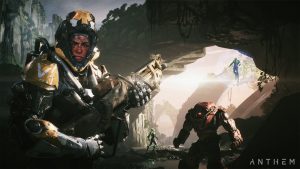BioWare’s Destiny competitor is decent enough to play, but feels half-finished and generic, and fails to live up to the developer’s previous standards.
An illustrious past can be a burden, rather than an asset – and BioWare is in danger of experiencing that. For decades, BioWare bestrode the world of RPGs like a colossus, nonchalantly creating classics like the Mass Effect and Dragon Age games, Star Wars: Knights of the Old Republic and the like. It was bought by publisher Electronic Arts in 2007 but continued to churn out a string of hits, although founders Ray Muzyka and Greg Zeschuk left in 2012. Then, its all-conquering reputation began to splinter.
2017’s Mass Effect Andromeda was unexpectedly poor, saddled with embarrassingly bad outsourced motion-capture. That inevitably ramped up the scrutiny on the developer’s next game, Anthem, which would be a major departure for BioWare: a Destiny-style game-as-a-service, of the type beloved more by games publishers (because it allows them to maximise earnings and cash-flow by flogging loot boxes) than gamers. So, was Anthem’s move away from BioWare’s pure-RPG roots into the realms of persistent-world shooters a bold or foolhardy one?
Alas, it was the latter. While Anthem has some good points – and its very nature means that it can be constantly updated and improved – it fails to convince when viewed as a whole. Since launch, it has achieved decent sales figures – a tribute to EA’s marketing machine – but it signally fails to live up to BioWare’s previously stellar standards.
 Anthem is easy enough to describe – it’s a third-person co-operative shooter with various twists, along similar lines to Destiny (except that currently, it lacks a player-versus-player element, which it will surely acquire at some point). It has an RPG-style progression structure, and takes place in a huge open world on an unnamed planet beset by a terraforming force, dubbed the Anthem of Creation, which is out of control, causing cataclysms that its inhabitants struggle to cope with.
Anthem is easy enough to describe – it’s a third-person co-operative shooter with various twists, along similar lines to Destiny (except that currently, it lacks a player-versus-player element, which it will surely acquire at some point). It has an RPG-style progression structure, and takes place in a huge open world on an unnamed planet beset by a terraforming force, dubbed the Anthem of Creation, which is out of control, causing cataclysms that its inhabitants struggle to cope with.
As with Destiny, there are various alien factions which you must fight: the native Scars, the Dominion (power-crazed baddies), and Outlaws, who delighted in perpetrating random chaos. You play a Freelancer: a civic-minded elite fighter defending the citizens of Bastion (the nation in which Anthem takes place), who are demoralised and huddled in towns and cities.
The best thing about being a Freelancer is that you get to wear a Javelin suit. Javelins enable you to fly around, and bring mech-style benefits like heavy weapons, elemental abilities and armour. Happily, they have none of the lumbering feel of a mech. Javelins are at the very heart of Anthem: there are four of them – the all-rounder Ranger, the quick, melee-centric Interceptor, the tank-like Colossus and the Storm, which encourages you to hover above battlegrounds and fight as if you were a mage. As you hit certain levels in the game, you are allowed to unlock a new Javelin, and at each point, you can choose from any of them.
Thanks to the Javelins, first impressions of Anthem aren’t that bad. The suits are the best thing about the game: the ability to fly which they bring to the game is thrilling, and they handle superbly. They overheat after a while but, cutely, you can cool them down by flying through waterfalls.
You often encounter waterfalls thanks to Anthem’s second-best aspect: its level design is very impressive indeed. The satisfyingly large open world is impeccably designed, with vast amounts of vertical elevation, large caves and a pleasingly lush and detailed look. Unfortunately, the open world itself is much more convincing than anything BioWare has placed in it.
 Anthem’s combat is decent enough, too, without managing to reach a level that might be described as inspirational. The game forces you to play with three others, and much of the time, it’s difficult to see why – unless you have an extraordinarily well organised bunch of friends, you’ll be playing with randoms, and there are few opportunities for communication or strategy.
Anthem’s combat is decent enough, too, without managing to reach a level that might be described as inspirational. The game forces you to play with three others, and much of the time, it’s difficult to see why – unless you have an extraordinarily well organised bunch of friends, you’ll be playing with randoms, and there are few opportunities for communication or strategy.
You can see why BioWare forced the four-player co-op, though, as the combat isn’t all about the guns (which are somewhat on the weedy side, particularly when compared with the likes of Destiny 2 or The Division 2). What’s crucial, though, is for team members to combine to create combos, using their elemental special abilities to pile into enemies and create huge amounts of damage. So, one player may initiate a combo with a lightning-based area attack, say, before another weighs in with a fire-based one, and so on.
The special attacks, which are pleasantly varied for each Javelin (marking the only aspect of the game’s loot system which works well) have cooldowns, so using them at the right time, and hiding while you wait, is key. At no point does Anthem actually explain how combos work and what they are all about, which is utterly in keeping with its ragged, poorly structured nature.
Anthem does have a storyline, which is mainly delivered, in the city of Fort Tarsis, in first-person mode. But it isn’t much of a story, emphasising how far BioWare has strayed from its roots (it used to win awards for narrative thrust). The game begins with a flashback to a Freelancer mission to a cataclysm called the Heart of Rage, which proved disastrous, so much of the story concerns rebuilding the reputation of Freelancers (in tandem with the city-guarding Sentinels). You encounter some deeply annoying characters, and the story initially fails to engage, although it does improve a tiny bit after a change-up mid-way through, eventually producing the odd moment which is vaguely reminiscent of a Mass Effect game.
Unfortunately, the gameplay proves not to be any more engaging, once you get over the initial novelty of being able to fly, and finish marvelling at the virtual scenery. The missions – which mostly resemble Destiny’s Strikes, complete with no-respawn areas — swiftly become repetitive, and the bosses you encounter are mere bullet-sponges. There are public events, which also bring nothing that Destiny hasn’t already done, except with more finesse and imagination.
The one element we did enjoy was a Stronghold, equivalent to a Raid in Destiny. The first one unlocked just as Anthem threw an outrageous spell of grinding – in Freeplay mode, with some idiotically specific and niggly goals – at us, so clearing the Stronghold at least reduced the time we had to spend grinding. But currently, there aren’t many Strongholds in the game – BioWare should hurry up and build a load more.
 Given that one of the major motivations behind BioWare making Anthem, rather than one of the RPGs that it used to be so good at, appears to have been to facilitate a loot system, Anthem’s loot system is deeply unimpressive. The guns and objects you pick up are always pretty similar to what you had before, only with ever so slightly better stats, so you spend ages fiddling around with equipment which isn’t markedly better than what you had before. There is a decent crafting system, which comes in handy if you develop a shine to a particular type of gun, but it, too, merely provides incremental improvements.
Given that one of the major motivations behind BioWare making Anthem, rather than one of the RPGs that it used to be so good at, appears to have been to facilitate a loot system, Anthem’s loot system is deeply unimpressive. The guns and objects you pick up are always pretty similar to what you had before, only with ever so slightly better stats, so you spend ages fiddling around with equipment which isn’t markedly better than what you had before. There is a decent crafting system, which comes in handy if you develop a shine to a particular type of gun, but it, too, merely provides incremental improvements.
The real problem with Anthem, though, is how generic and uninspired it is. All the activities in the open world – whether in a story mission or freeplay – feel cliched and unimaginative. There are periods when the game forces you into drudge-like grinding. And when you finish the story, the endgame has precious little to offer beyond the things you got bored of ages ago.
Anthem’s open world is great, as are the mechanics of its Javelin suits, and it contains some interesting ideas, like the concept of combos. But none of those ideas feel fully realised, and the game-world has a half-filled air to it. Like Battlefield V, Anthem seems to have been launched in a half-finished state – if that.
No doubt EA and BioWare will throw resources at it and add many of the elements which it should have had when it was released: its lack of PvP gameplay, in particular, is a glaring omission. But even then, it’s difficult to believe it will ever develop as much personality — or evolve into something as engaging as — Destiny 2. It resembles something that was designed by a committee, and that is worlds away from used to make us go out and buy BioWare games.
